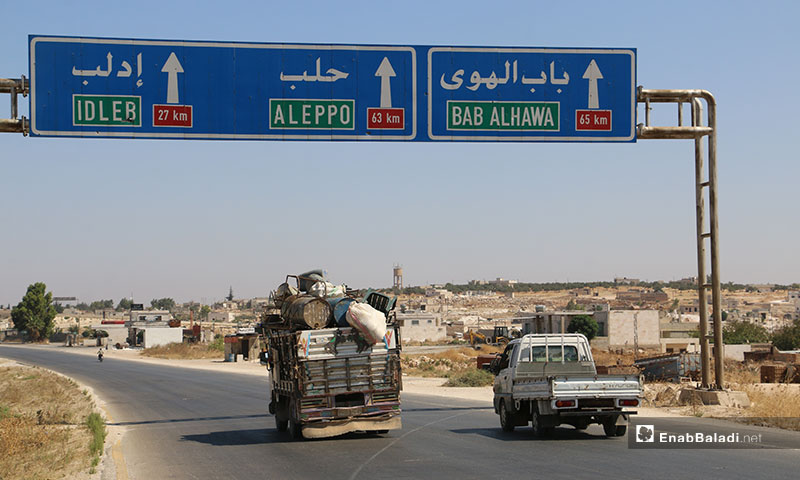In the southern countryside of Idlib, the shelling subsided after the truce agreement proclaimed by the attacking forces, the Syrian regime forces and their Russian allies, went into effect on August 31. Nevertheless, that calm has not yet brought reassurance to the hundreds of thousands who have been displaced since the breakout of the military campaign last February. They are still suffering to find a safe shelter to accommodate them and secure their needs, given that the offensive has catalyzed the largest wave of displacement the region experienced during the past eight years of conflict.
The area’s humanitarian organizations, for their part, worked to launch projects and initiatives aimed at assisting the displaced, despite the many difficulties that are hindering their activities, most notably the overcrowdedness at the camps and the lack of funding.
Hotline for ‘IDPs’
On August 24, 2019, the Violet Organization launched an initiative based on guiding IDPs to areas where they can find safe houses and housing centers, posting ‘hotline’ numbers on its official platforms, through which the displaced reach out for the organization, which, then, provides them with the appropriate accommodation sites.
The Director of the Violet Hotline Room, Maad al-Khalaf, told Enab Baladi that the IDPs were ignorant of the places ready to accommodate them. Therefore, they used to head to the crowded sites and others where renting a house would cost a fortune, such as Harem, Salqin and al-Dana. Carrying their belongings and looking for shelters which are not available due to the high congestion, the displaced were forced to pay exorbitant transport costs that they desperately need.
Contacting the heads of the local councils’ in the safe areas, al-Khalaf managed to obtain the numbers of houses and places suitable for housing and cooperated with the coordinators who run these areas, including Maarat al-Artik, Hayan, Hraytan, Kafr Hamra, Anadan and Khan al-Asal. Al-Khalaf, next, directed the families to meet the coordinators who brought them directly to their new shelter.
To make sure that the number of the places available matched the number of families in need for shelter and to manage assessing the housing process, the organization asked the IDPS to provide its team with simple information, such as full name of each of the IDPs, the number of family members and the name of the area they came from. Al-Khalaf, commenting on this, said that the team so far succeeded in housing 1,100 families in the target areas.
Moreover, the Violet Organization makes contact with the local councils and the coordinators every day to update its data on the number of families and houses available. Al-Khalaf added that Maarat al-Artik’s houses became full of people yesterday and that the organization is seeking to find new areas to continue providing the displaced with these services.
Infrastructure rehabilitation in Harem camps
The Saed Charity Organization has started a project aiming at the rehabilitation of the infrastructure in the Harem camps in July, trying to prevent the recurrence of drowning accidents— deaths caused by the torrential rain and lack of services in the past years, as the project’s director, Obada Arwani, clarified to Enab Baladi.
The project, to respond to the needs of the newly displaced, addressed three major aspects: graveling the roads around and inside the camps, draining off rainwater through building a drainage channel inside the camps or in their surroundings, and installing drains with raising tents’ floor and building toilet blocks.
Arwani added that time is one of the key challenges facing the project, as well as the ever-changing nature of the camps and their permanent expansion, in addition to the continued influx of IDPs and setting up new tents.
Arwani added that the project must be completed by the end of December 2019.
Vulnerable groups are the focus
The board member of Abrar Organization , Wael Halabi, pointed out to Enab Baladi that the organization is working to set up a special camp for widows and people with special needs in Taoum village, affiliated with Taftanaz subdistrict in the northeastern countryside of Idlib, as a response to the emergency needs of displaced persons fleeing the shelling areas in the southern countryside of Idlib.
The camp, which encompasses four dunums and consists of 200 tents so far, is liable to expansion. Besides, the organization selects the camp residents according to certain priorities, starting with female-headed and child-headed households and families, where one or more members are with disabilities, to displaced families in general.
Once the project is finalized, Halabi also mentioned, the Abrar Organization will provide a variety of services to the camp residents, including courses aiming at women empowerment, helping widows to come up with suitable employment opportunities, and protection courses for people with disabilities, not to mention medical supplies and following up the people’s conditions.
The northwest area has more than 9,9000 camps including 5,900 informal ones, which are not run by humanitarian organizations, while the number of asylum seekers increased by 16% during the year, according to UN estimates.
On the ground, 22 organizations are active in the sector of camp care and administration.
Despite receiving donations from the UN, the funding shortfall the organizations are enduring due to obtaining only 28 percent of the funding required for 2019 and the displacement of nearly one million persons in the last six months made the task of the organizations more difficult and brought more suffering to people in the northwest of Syria, according to the statistics of the Syria Response Coordination Group (SRCG).

